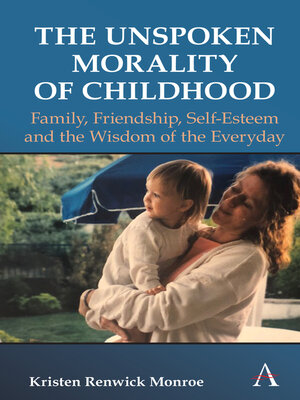The Unspoken Morality of Childhood
ebook ∣ Family, Friendship, Self-Esteem and the Wisdom of the Everyday
By Kristen Renwick Monroe

Sign up to save your library
With an OverDrive account, you can save your favorite libraries for at-a-glance information about availability. Find out more about OverDrive accounts.
Find this title in Libby, the library reading app by OverDrive.



Search for a digital library with this title
Title found at these libraries:
| Library Name | Distance |
|---|---|
| Loading... |
The Unspoken Morality of Childhood reflects the thoughts of a senior ethicist as she ponders the moral questions we all encounter in everyday life. Each essay describes a commonplace event: a child learning to read or asking to be quizzed on spelling, first graders bonding on playground swings, brothers talking on the way home from school, a young girl leaving for college. Monroe sensitively infuses these moments with a thoughtful tenderness that reveals the beauty in our daily routine and the wisdom all parents crave. Her reflections on the ethical issues raised as part of our daily lives lend valuable insight into critical moral topics: how nostalgia and love of home can be exploited by unscrupulous politicians who turn fear into political weapons that divide us but elect them. How forgiveness may not always be the best way to move on after a hurt. Moral imagination's unique ability to help us conceptualize our way out of seemingly intransigent problems. Agency, passion, unconditional love, and the painful growth that can accompany loss. Above all, Monroe highlights the tremendous power of identity and self-esteem and the recognition that we must honor the humanity in others in order to fully claim it in ourselves.
|The Unspoken Morality of Childhood: Family, Friendship, Self-Esteem and the Wisdom of the Everyday reflects the thoughts of a senior ethicist. Each essay begins with a homey essay about the kind of everyday event that happens to everyone and then proceeds to discuss the ethical issues raised by such an event. The manuscript is interdisciplinary, located at the intersection of ethics, political psychology, moral psychology, philosophy, and political science/political theory. It uses stories to teach ethics and falls in the virtue ethics approach to ethics, making it perfect as a supplementary text for introductory courses to philosophy, moral psychology and political theory.
The manuscript discusses complex ethical concepts such as identity, agency, self-esteem, forgiveness, relations with our parents, dealing with loss, the moral imagination, and a wide range of other issues that people confront every day.
One of the essays, "Walnut", tells a story about the author's visiting her grandparents in a small, Midwestern town. This is turned into a discussion of the need for roots, how children formulate their sense of self, and how politicians like Donald Trump can turn the love of family and nostalgia for the past into a vicious tool in politics in which clever politicians exploit fears of foreigners and people who are "not like us." Another essay describes a tired mother reading a piece of science fiction late at night, given to her by one of her children. A story by Olivia Butler asks why a black woman should be interested in science fiction and shows the value of the moral imagination, as science fiction reveals how those who can imagine alternate realities can then alert us to new possibilities, and better worlds. As Robert Kennedy was wont to ask: Some see the world as it is, and ask why. I imagine the world as it could be, and ask why not? The essay uses this prompt to discuss the importance of the moral imagination and the ability some have to conceptualize their way out of a dilemma that can plague others.







